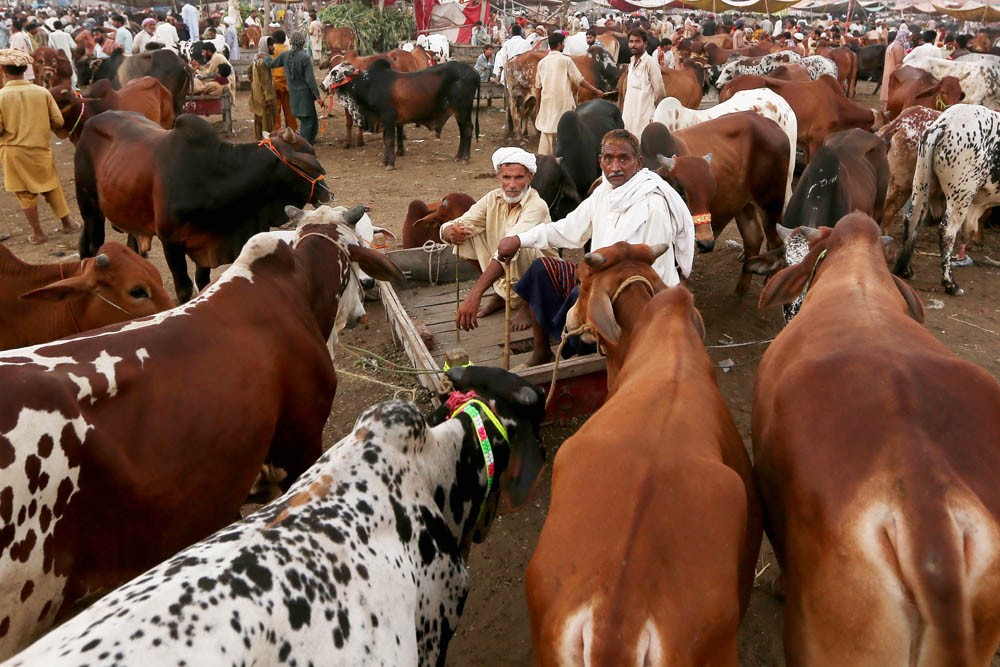
Is the fear of Congo virus changing the way we handle sacrificial animals?

This year, Eidul Azha is going to be a tad different for the faithfuls. The fear of Congo virus is responsible for the change.
The deadly virus, whose medical name is Crimean-Congo Haemorrhagic Fever (CCHF), is transmitted from the ticks of infected animals. The ticks thrive in the skins of goats, cows, buffaloes and camels. The virus is reported to have taken the lives of at least five people in Punjab, in the year so far.
As the auspicious Muslim festival draws near, a majority of people in the city are already looking to perform the ritual of ‘qurbani’ (sacrifice) away from their homes.
Meat processing companies are having a field day. They have received an unusually high number of calls lately, from people inquiring about bookings of sacrificial animals. The companies are hoping to get bulks of orders.
Talking to TNS, Zenith Meat’s Anis Ahmad says, "People want to perform the ritual safely. They are calling us to book orders. In fact, we have limited stock and shall need to stop bookings well ahead of the Eid day."
He also reveals that his company is booking orders for the first two days of Eid only.
The rates the company is charging are as follows: Rs25,000 for the goat, Rs25,500 for sheep, Rs70,000 for cow, and Rs11,700 for one share (hissa) in cow.
"Obviously, the people are scared," Ahmad says. "I believe their apprehensions are not unreal. A female hulma [a tick species manifested in the skin of goats, cows and sheep] is capable of becoming a vector of Congo virus. So, those who are educated and also health conscious would not risk slaughtering the animal at home. They would rather go to modern, well-equipped slaughterhouses or meat processing companies for that."
An employee at Anis Meat Company, of Safi Group of Companies, says that the firm is flooded with orders because "we have an arrangement of storing meat for as many days as the customers want. Besides, we do not charge for storing qurbani ka gosht for the three days of the Eid. Beyond that time, the customer has to pay a set fee."
Business is soaring for animal farms and seminaries also. To quote a seminary teacher, "More and more people are contacting us. They want to know about the method and rate of pooling in a collective qurbani [at the seminary]. This year, we’ve got more orders than we did last year."
Muhammad Waseem, a trader based in Garden Town, has another view: "There’s something wrong with the sacrificial animals this year. We see a lot of adverts running on different TV channels and printed in newspapers that are meant to create awareness about the Congo virus and precautionary measures that must be taken in handling an animal or its meat.
"Personally, from whatever I gather from the ads, I am not going to bring an animal home. But because I must do qurbani, I am going to approach a meat processing company."
Nawaz, a resident of Tajpura, sounds a similar concern. "We should not put our lives at stake [by bringing a sacrificial animal home]. I fear my children might contract the virus because they enjoy playing with animals. For all I know, they might touch the skin [of the animal]."
Correspondingly, the cattle market is down big-time. To quote an animal seller, "The district government has started using anti-Congo sprays in and around the market. We have been asked to wear masks and gloves. This, I believe, instills fear in the hearts of the potential customers and, therefore, affects our business adversely."
Not everyone is afraid of contracting the virus. There are places, particularly in old city, where the people don’t even know such a thing exists. They have lots of sacrificial animals in their homes. Even those who know about the virus, have no care for it. Ahmad Shah, of Badami Bagh, is one such man. "Oh, we hear such stories every year," he says. "We bought two cows and three sheep a month ago. Everything is ok with my family as well as my animals."
A senior veterinary officer in Punjab Livestock Department says the situation is under control. "People should not panic as there are 35 species of ticks and only one species is capable of becoming the vector of Congo virus. The ticks manifested in the skin of sacrificial animals of Punjab are free of the virus."
When asked about the death of eight cattle handlers due to Congo virus, the veterinary officer says they came to Punjab from Balochistan.
"The government is vaccinating the sacrificial animals including goats, sheep and cows. These animals are immune from ticks carrying Congo virus. The department has given proper training to the cattle handlers to prevent them from contracting the virus.
The livestock department has set up screening camps at different entry and exit points in the city. No animal shall be allowed in until it has got the anti-Congo spray."
In the end, the officer advises the buyers to wear gloves and masks before entering the meat markets.